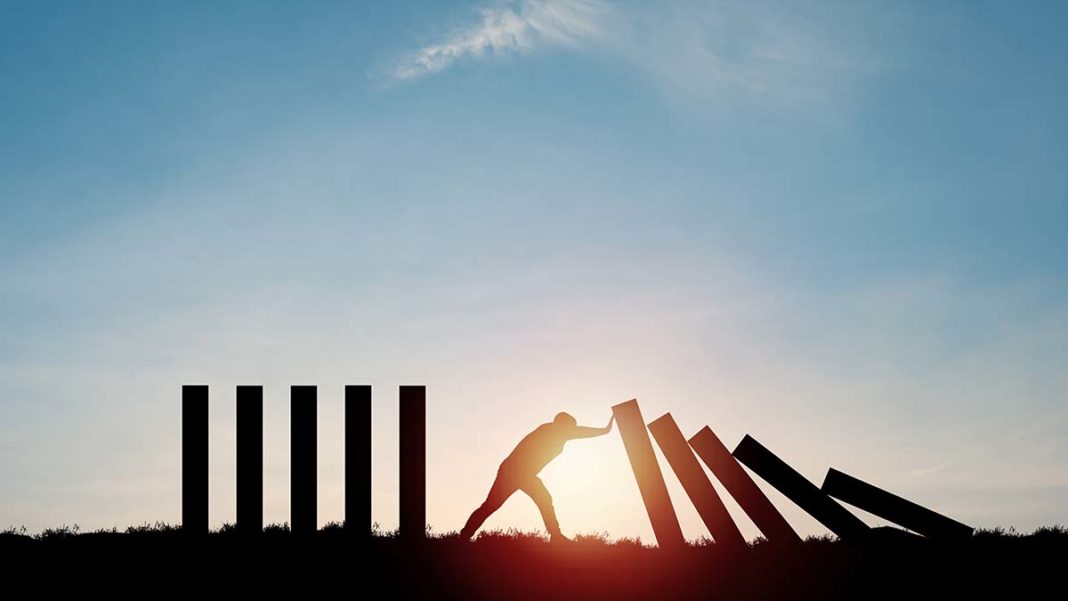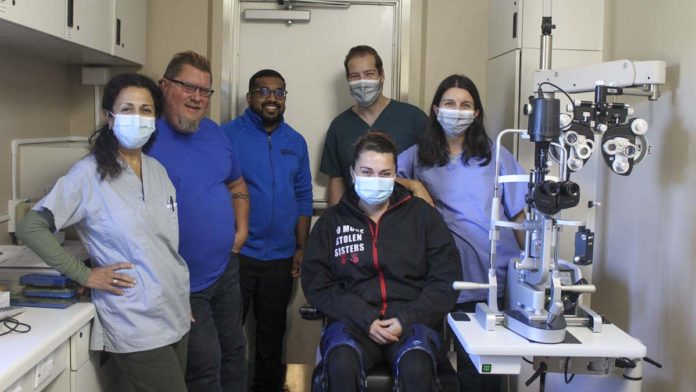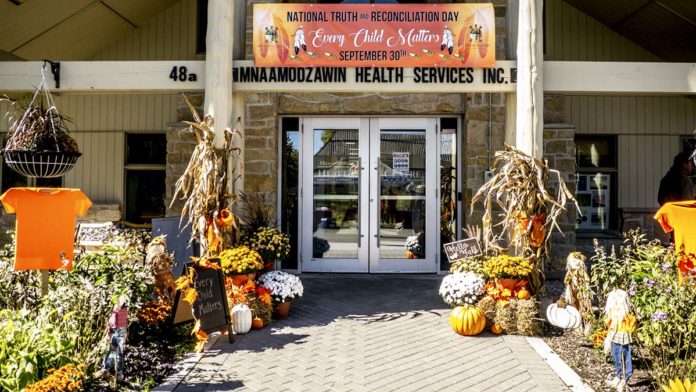AUNDECK OMNI KANING—Manitoulin service providers hosted a recovery celebration breakfast on September 21 to raise awareness about addiction and recovery issues in the community. The breakfast is a chance to celebrate people’s recovery and for others to hear some success stories, said Rob Wabegijig, event co-organizer and addictions support worker with Noojmowin-Teg Health Centre.
It was the 10th annual breakfast and followed a two-year break imposed because of the COVID-19 pandemic.
“It’s for people who have addictions and are in recovery, to listen to other people talk about their recovery,” said Joan Hoekstra, an addictions services case worker with M’Chigeeng First Nation. “It’s to get together and share that they’re not alone. It’s a celebration that they’ve stayed on a pathway that’s healthier for them.”
“We want to try and decrease stigma around recovery and addictions and to show people that there is support from the whole community and from all these different agencies,” said Allison Dodge, a mental health and addiction worker with Noojmowin Teg Health Services.
Aaron Case was the first speaker. This past May, Mr. Case celebrated six years of sobriety from opioids. (For more about his story, see The Expositor supplement, ‘Out of the Shadows: An in-depth look at Manitoulin’s opioid crisis’).
Mr. Case started out as a recreational marijuana user before proceeding into cocaine, then crack cocaine, which eventually led to a full-fledged addiction to opioids. “I literally hit rock bottom so many times I could draw you a detailed map of every corner and crevice. It wasn’t a nice place,” he said.
His last rock bottom occurred when he overdosed in somebody’s basement apartment. If it wasn’t for his partner Alicia using ‘Find my iPhone,’ he’d probably be dead right now, he said.
Six months after that, he entered into treatment at Bellwood Health Services in Toronto. “I walked through those doors. It was one of the scariest things I’d ever done in my life. It wasn’t easy. I tried to stop using so many times and I was just missing so many different things. I thought, ‘I can do this by myself. I don’t need anybody’s help.’ That wasn’t the case at all.”
Time and time again, Mr. Case fell through the cracks on Manitoulin Island when trying to access different services. “Back in the day we didn’t have services like we do now so for anybody that may be thinking about starting your journey into recovery, there are some great options right now here on Manitoulin Island that we didn’t have before, and I’m very grateful for that,” he said.
Attending Bellwood changed his life. “It really was an amazing experience but as anybody that’s been in treatment knows, when you’re in treatment you’re in a very, very safe bubble. It’s not until a couple days before you leave that it hits you, that you’re going back to the same place. You’re the only one that’s changed. Nothing else has changed. That was tough,” he said.
Back on the Island, Mr. Case had the support of Dr. Lionel Marks de Chabris, a pain management and addictions specialist in Espanola. He’d been a patient since before his overdose but was warned that he had to put in the time and effort to continue as a patient. “I knew I couldn’t lose him,” Mr. Case said. “He was the first doctor that actually seemed to care about me. He wanted to see me succeed. He’s literally been with me every step of the way.”
Mr. Case was one of the first people in Canada to receive a buprenorphine implant, a long-acting, low dose implant that is placed in your arm. “What this medication did for me was it took the stigma away of going to the pharmacy,” said Mr. Case. “It gave me my life back, to be a normal, functioning citizen again, without being tied to the pharmacy counter and appointments.”
“Addiction is a disease and like other diseases, sometimes medication is needed,” Mr. Case pointed out. “There’s no shame in using that for your advantage. Any tool you can use to help yourself is a good thing.”
What has recovery brought him? Friends and family that he had lost touch with. Fatherhood: he became a father 11 months ago, to a little girl named Julia. “She’s beautiful and she’s mine and I’ll do anything I can to keep that little baby safe and happy. My partner Alicia of 26 years. She’s seen the good, the bad and the ugly, and then back to the good. She’s my rock and I really don’t know what I’d do without her.”
He also credits the support of his “best buddy, Dave” who has “helped me in so many ways, he probably doesn’t even realize all the things he’s done. He’s never judged. He offered friendship when I really didn’t have any friends, and he reintroduced me to a passion that I really love, fishing.”
“When I was deep in my addiction, all the shame all the guilt, it’s literally dripping off you as you’re walking down the street,” said Mr. Case. “You’ve got your head down and you’re not feeling good about yourself. I am happy to say that I do love myself again. All the self-doubt, shame and guilt I carried all the time is almost gone, but not quite. I don’t feel like you should ever forget about the things you’ve done in your life. Always keep that in the back of your mind so you don’t go back there.”
Keeping busy, retaining structure and a community of support (for Mr. Case, it’s the fishing community) were additional keys to recovery, as is helping others. Not long after he left treatment, he began volunteering at Rainbow Lodge and four years ago, he took a chance and applied to a job posting at Gwekwaadziwin Miikan. They in turn took a chance on him and gave him a job. After five months, Mr. Case became a full-time staff member. He is currently a team leader/supervisor, helping guide the team that goes onto the land.
“Understanding what people are going through in their treatment, being able to relate, knowing that I’d gone down the same road, same thoughts, same feelings, fears of the unknown, I feel made me a good counsellor,” he said.
“Recovery isn’t easy,” he said. “Every day when you wake up you have to be the best possible you that you can be,” he said. “But you don’t have to be perfect 100 percent of the time,” he said. “Find a passion or a hobby. Stay present; don’t think about the past and don’t worry about the future. Just focus on today.”
The second speaker was Jesse, a graduate of Gwekwaadzin’s treatment program. “I myself am on the road of recovery at 419 days,” he said. “I am only at the beginning of this lifelong journey. What I’ve found is we’re all on the same road, simply because we love ourselves. Deep down there is something out there for each and every one of us. I can only share what has been working for me and that is finding something that I love doing, something that makes me feel complete, something so strong it changes the way I look at life, something that has taken away all or most of the pain I tried to cover up most of my life.”
“It’s always good listening to the speakers,” said Denise Shawana, a case worker with Wiikwemkoong’s Addiction Services Initiative. “They all come from different backgrounds and their stories are all different. Their roads to recovery are always different. It is really uplifting for everyone to hear the speakers. I find it gives them that boost that they need sometimes if they’re struggling themselves to know that it’s possible. There is hope.”





